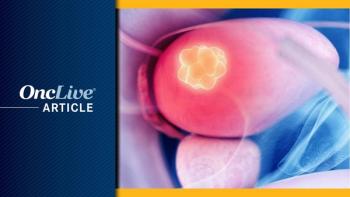
Dr Ye on the Safety and Efficacy of BL-B01D1 in Locally Advanced/Metastatic Urothelial Carcinoma
Dingwei Ye, MD, PhD, discusses the safety and efficacy outcomes of a clinical trial evaluating BL-B01D1 in locally advanced or metastatic urothelial carcinoma.
Dingwei Ye, MD, PhD, professor, director, the Multidisciplinary Team for Genitourinary (GU) Cancer, director, Fudan University Prostate Cancer Institute; president, GU Cancer Committee of Chinese Anti-Cancer Association, discussesthe safety and efficacy outcomes of a phase 1b/2 study (NCT05785039) evaluating the potential first-in-class antibody-drug conjugate (ADC) BL-B01D1 in patients with locally advanced or metastatic urothelial carcinoma.
Ye begins by noting that this ADC is comprised of an EGFR x HER3 bispecific antibody attached to a novel topoisomerase I inhibitor payload.
Early results from the investigation of BL-B01D1 were presented at the
The efficacy data were promising, Ye reports. The confirmed overall response rate (cORR) with BL- B01D1 was 33.3% (95% CI, 16.5%-54.0%) in the total population (n = 27). In patients who had receieved 1 prior line of chemotherapy (n = 12), the cORR was 75.0% (95% CI, 42.8%-94.5%), he adds. Additionally, the disease control rate (DCR) was 96.3% (95% CI, 81.0%-99.9%) in the total population and 100% (95% CI, 73.5%-100%) in those who had received priorchemotherapy.
The median duration of response (DOR) was not reached (NR; 95% CI, NR-NR) and the 6-month DOR was 100% (95% CI, 100%-100%) across both groups. Ye reports that the median progression-free survival (PFS) was not reached in either group; the 6-month PFS rate was 62.4% (95% CI, 62.4%, 32.2%-82.2%) in the total population and 100% (95% CI, 100%-100%) in the prior chemotherapy population.
No treatment-related deaths or interstitial lung disease events were reported, Ye continues, noting that the most common treatment-related adverse effects (TRAEs) were hematologic toxicities. Additionally, no new safety signals were observed with BL-B01D1, Ye concludes.



































